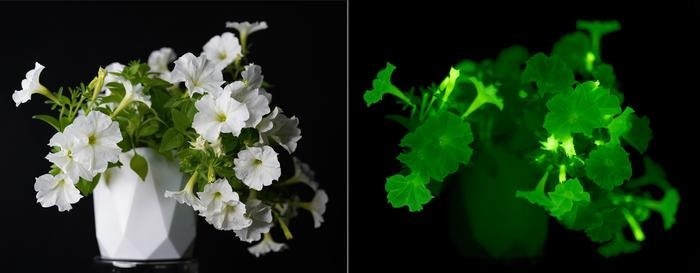New findings that have been published in the journal Science Advances have revealed a naturally occurring plant gene that makes it easier for scientists to capture the fascinating glow of bioluminescent plants. This gene, which differs between species of plants, enables the conversion of living energy into organic light.
 The Firefly Petunia emits a continuous glow similar to moonlight. Its enchanting light is produced by genes isolated from bioluminescent mushrooms. The petunia has proven to be hugely popular, offering a natural source of illumination for homes, gardens, and beyond. Image Credit: Light Bio, Inc.
The Firefly Petunia emits a continuous glow similar to moonlight. Its enchanting light is produced by genes isolated from bioluminescent mushrooms. The petunia has proven to be hugely popular, offering a natural source of illumination for homes, gardens, and beyond. Image Credit: Light Bio, Inc.
This advancement unveils the intricate inner rhythms and dynamics of plants through continually evolving luminosity, providing a natural source of illumination for homes, gardens, and beyond.
Light Bio, a pioneer in the development of bioluminescent plants, supported the research. Light Bio is committed to promoting increased enjoyment and connection with plants by showcasing the alluring qualities of living light.
The new study extends previous discoveries by demonstrating how the natural luminosity of luminous mushrooms harmonizes with central metabolic pathways in plants. This bioluminescent harmony is further amplified by using a gene that is native to plants, which optimizes the interaction between light production and energy utilization.
Previously, five fungal genes were incorporated into plants to produce bioluminescence. According to the new research, two of the fungal genes can be effectively replaced by a single plant-derived gene. The plant gene is more adaptable for a wider range of applications due to its small size and less complex biological requirements.
As a link between plant metabolism and light production, the compact gene is essential. This relationship makes it possible to translate the internal dynamics of the plant into an ever-changing display of natural light.
People love bioluminescent plants so much that they have become very popular. A bioluminescent petunia known as FireflyTM Petunia, so named because of its bright buds that resemble fireflies, is now available for purchase from Light Bio. The petunia has a gentle, moonlight-like glow to it.
Sales for this remarkable plant have been impressively robust. We have had to ramp up production twice already to keep pace with the demand.”
Keith Wood, CEO, Light Bio, Inc.
The company chose the petunia as its inaugural offering because of its popularity as an ornamental plant. As of late, Light Bio has claimed that their plants can glow up to 100 times brighter than they were previously able to, with the petunia being the most brilliant. Petunias, with their prolific flowering and ease of cultivation, are a great option for this creative enhancement.
The USDA declared in September that the Firefly Petunia is safe for domestic cultivation and breeding after conducting an independent review. The petunia, which retails for 29 USD per plant on Light Bio's website, is scheduled to begin shipping to all 48 contiguous US states in April.
Future plants from Light Bio, in collaboration with Ginkgo Bioworks, should be at least ten times brighter and come in a wider range of colors and varieties. Beyond the sheer joy these bright plants bring, the underlying science provides a deep understanding of the molecular physiology of plants.
The research teams working together are optimistic that the findings of this study will result in important advancements in vital areas like disease resistance and crop development.
Source:
Journal reference:
Palkina, K. A., et al. (2024) A hybrid pathway for self-sustained luminescence. Science Advances. doi.org/10.1126/sciadv.adk1992